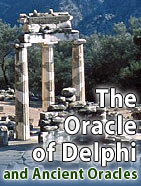
Michael Wood, The Road to Delphi
The Book
 Amazon. The Road to Delphi: Scenes from the History of Oracles / The Life and Afterlife of Oracles by Michael Wood, also available in
hardback. Please note, this is
not (pace Amazon.com) the same Michael Wood who produced "In the Footsteps of Alexander," "Conquistadors," "In Search of the Trojan War," etc. That Wood
could have written a book on oracles, but it would have been a different book. Michael
G. Wood, the author of
The Road to Delphi is a professor of English and Comparative Literature and author of a celebrated book on Nabokov. The book is therefore not primarily about the history of Greco-Roman oracles (although the subject is certainly present) but a wider meditation on meaning, language and indeterminacy. As James Davison says in the London Review of Books (below), this is "a work of criticism, not cultural history."
Amazon. The Road to Delphi: Scenes from the History of Oracles / The Life and Afterlife of Oracles by Michael Wood, also available in
hardback. Please note, this is
not (pace Amazon.com) the same Michael Wood who produced "In the Footsteps of Alexander," "Conquistadors," "In Search of the Trojan War," etc. That Wood
could have written a book on oracles, but it would have been a different book. Michael
G. Wood, the author of
The Road to Delphi is a professor of English and Comparative Literature and author of a celebrated book on Nabokov. The book is therefore not primarily about the history of Greco-Roman oracles (although the subject is certainly present) but a wider meditation on meaning, language and indeterminacy. As James Davison says in the London Review of Books (below), this is "a work of criticism, not cultural history."
Reviews
Transcript of interview with Michael Wood from ABC (Australia) program "Book Talk," with Amanda Smith.
"I think Christianity is what happened to oracles, it went inward, we acquired conscience, an internalised conscience rather than the external oracle."
The Guardian review, "Delphi bound" by John Banville (January 10, 2004). Review is a joy to read:
"Wood is nothing if not eclectic and, like one of his heroes, Roland Barthes, is a great treasurer of trifles, or what, at least, the world would consider trifling. The index to The Road to Delphi is an amusing read in itself, ranging as it does from Suetonius to Tom Cruise, from Adorno to WC Fields, from Oedipus to Nancy Reagan (she kept a court astrologer, as did, more surprisingly, François Mitterrand). Wood takes a panderer's delight in pushing strange bedfellows under the blankets together, so that we find Kafka snuggling up to Clark Kent, while, in the index again, "Trial, The (Kafka)" is followed immediately by "Truman Show, The (Weir)". And it is with only the softest of shamefaced chuckles that he notes how The Matrix has displaced Blade Runner as "the academic's smart cultural reference of choice". One just knows that Slavoj Zizek, the hottest contemporary guru, will sooner or later raise his hirsute head, and one is not proved wrong."
The Independent (UK) review, "A tale of smoke and mirrors" by Mary Beard, a celebrated Cambridge Classics prof. (January 2, 2004), "by turns brilliantly acute and self-indulgently rambling":
"Wood is at his worst when he turns to reflect on Nostradamus and 11 September or on his own penchant for newspaper horoscopes while in the stressful process of buying a house. And he never makes a convincing case for lumping these modern modes of prediction together with the Pythia and other ancient oracles, as if their very different institutional and religious contexts hardly mattered."
Washington Post review by Michael Dirda (August 31, 2003), calling it a "surprisingly wide-ranging meditation" he identifies failings:
"There was a book back in the 1950s called 'a short trot with a cultured mind.' That's what The Road to Delphi provides."
"The Fed as Oracle" by Christopher Mayer, a stimulating review article on Wood's book, with particular reference to the Federal Reserve. The piece is for the Ludwig von Mises Instiute, a Free-market Think Tank opposed to the Fed. Extending Wood's theory, Mayer concludes:
"The [Fed] thrives on a generalized dependency on feeling in control. Ignorance about markets have led to the creation of illusions that they can be controlled and managed to increase the prosperity of all."
London Review of Books review article by James Davidson . Rather than the "a short trot with a cultured mind" elsewhere charged against Wood, this is a long gallop through every imaginable terrain, a deep meditation on Wood's subject matter, and what he missed (eg., gods), concluding that what others see as deep-thinking is really little more than "cultured antiquarianism." The force of the performance is not unlike Davidson's Courtesans and Fishcakes, startling and ground-breaking, but eccentric and too-clever-by-half. You have to watch Davidson; he knows how to make the weaker argument the strong. If you're interested in oracles beyond the what-where-how, this is a must-read.
"If you embark on Wood's The Road to Delphi looking for cunning analyses of tricky plotting in mostly modern novels, plays and films you will not be disappointed, but the book claims to be something more than that .... For me, these ambitions are not realised."
Curled Up With a Good Book review by Barbara Bamberger Scott, "It goes just about everywhere, with humor, intellect and prodigious feats of literary mix and match."
About.com review by Contemporary Lit. guide John M. Formy-Duval. Lengthy and mostly positive.
Telegraph review "The Oracle is Always Right" by Tom Holland (December 22, 2003), a "fascinating and brilliant book."
Hilary Williamson, BookLoons Reviews, "weighty in erudition, not a quick or easy read."
Mini review from the Virginia Quarterly Review.

All material © 2000–2005 Tim Spalding. Books presented in association with Amazon.com.
If you enjoy this site you may like this other site by me:
Ancient Astrology and Divination. Annotated guide to over 200 sites about Greco-Roman divination. (This site is a spin-off from it.)
The Wiki Classical Dictionary. New project includes a category for divination and oracles.